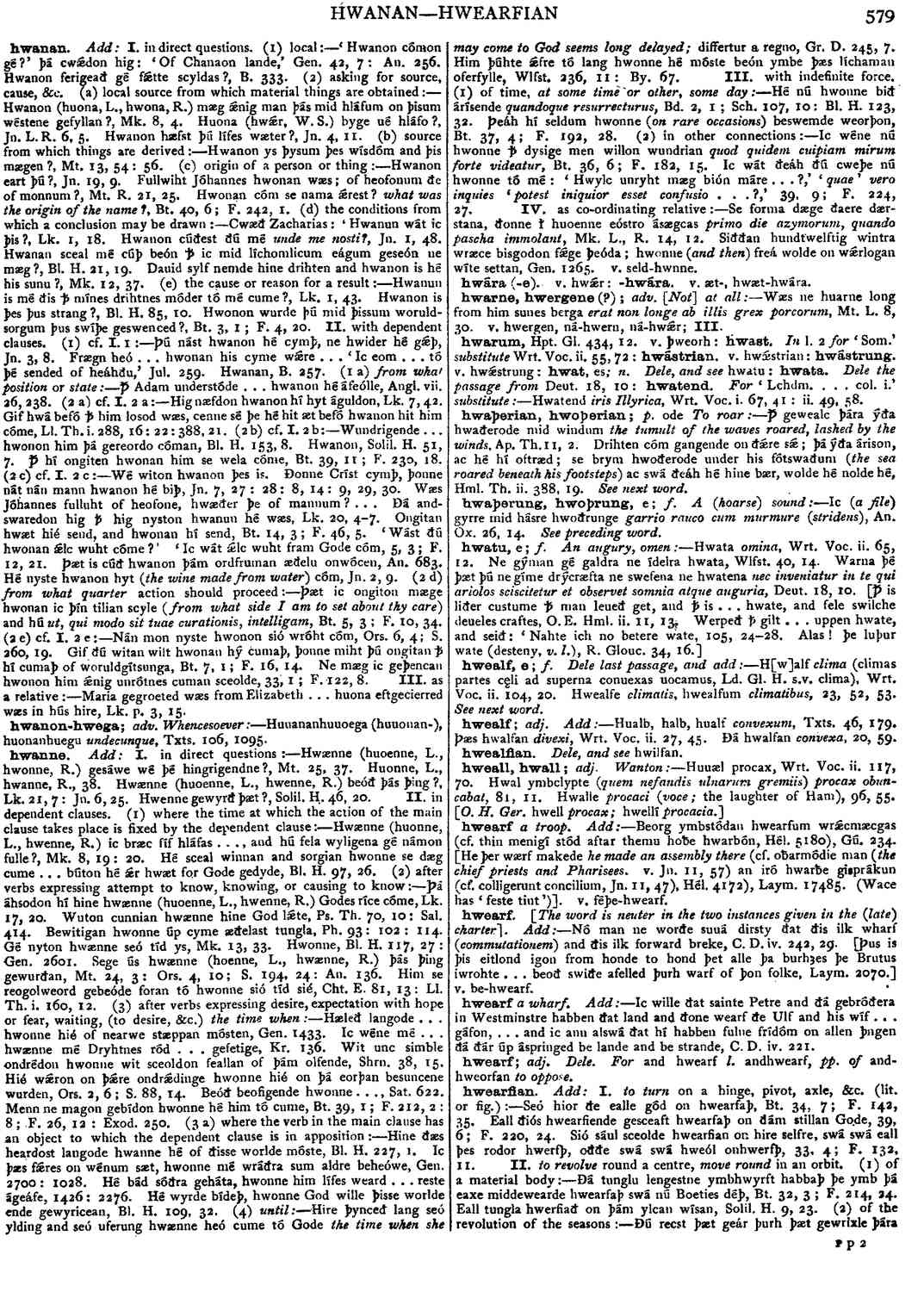hwanne
-
Hwænne (huoenne,
- L., hwonne, R.) gesáwe wé þé hingrigendne?, Mt. 25, 37.
-
Huonne,
- L., hwanne. R., 38.
-
Hwænne (huoenne,
- L., hwenne, R.) beóð þás þing?, Lk. 21, 7: Jn. 6, 25.
-
Hwenne gewyrð þæt?,
- Solil. H. 46, 20.
-
Hwænne (huonne,
- L., hwenne, R.) ic bræc fíf hláfas ... .
-
Hé sceal winnan and sorgian hwonne se dæg cume ... búton hé ǽr hwæt for Gode gedyde,
- Bl. H. 97, 26.
-
Þá áhsodon hí hine hwænne (huoenne,
- L., hwenne, R.) Godes ríce cóme, Lk. 17, 20.
-
Wuton cunnian hwænne hine God lǽte,
- Ps. Th. 70, 10: Sal. 414.
-
Bewitigan hwonne úp cyme æðelast tungla,
- Ph. 93: 102: 114.
-
Gé nyton hwænne seó tíd ys,
- Mk. 13, 33.
-
Hwonne,
- Bl. H. 117, 27: Gen. 2601.
-
Sege ús hwænne (hoenne,
- L., hwænne, R.) þás þing gewurðan, Mt. 24, 3: Ors. 4, 10; S. 194, 24: An. 136.
-
Him se reogolweord gebeóde foran tó hwonne sió tíd sié,
- Cht. E. 81, 13: Ll. Th. i. 160, 12.
-
Hæleð langode ... hwonne hié of nearwe stæppan mósten,
- Gen. 1433.
-
Ic wéne mé ... hwænne mé Dryhtnes ród ... gefetige,
- Kr. 136.
-
Wit unc simble ondrédon hwonne wit sceoldon feallan of þám olfende,
- Shrn. 38, 15.
-
Hié wǽron on þǽre ondrǽdinge hwonne hié on þá eorþan besuncene wurden,
- Ors. 2, 6; S. 88, 14.
-
Beóð beofigende hwonne ...,
- Sat. 622.
-
Menn ne magon gebídon hwonne hé him tó cume,
- Bt. 39, 1; F. 212, 2: 8; F. 26, 12: Exod. 250. (3 a)
-
Ic þæs fǽres on wénum sæt, hwonne mé wráðra sum aldre beheówe,
- Gen. 2700: 1028.
- Hé bád sóðra geháta, hwonne him lífes weard ... reste ágeáfe, 1426: 2276.
-
Hé wyrde bídeþ, hwonne God wille þisse worlde ende gewyricean,
- Bl. H. 109, 32.
-
Hire þynceð lang seó ylding and seó uferung hwænne heó cume tó Gode
the time when she may come to God seems long delayed;
differtur a regno,- Gr. D. 245, 7.
-
Him þúhte ǽfre tó lang hwonne hé móste beón ymbe þæs líchaman oferfylle,
- Wlfst. 236, 11: By. 67.
-
Hé nú hwonne bið árísende
quandoque resurrecturus,
- Bd. 2, 1; Sch. 107, 10: Bl. H. 123, 32.
-
Þeáh hí seldum hwonne (
on rare occasions
) beswemde weorþon,- Bt. 37, 4; F. 192, 28.
-
Ic wéne nú hwonne ꝥ dysige men willon wundrian
quod quidem cuipiam mirum forte videatur,
- Bt. 36, 6; F. 182, 15.
-
Ic wát ðeáh ðú cweþe nú hwonne tó mé: 'Hwylc unryht mæg bión máre ...?,'
'quae' vero inquies 'potest iniquior esset confusio ...?,'
- 39, 9; F. 224, 27.
-
Se forma dæge ðaere daerstana, ðonne ł huoenne eóstro ásægcas
primo die azymorum, quando pascha immolant,
- Mk. L., R. 14, 12.
-
Siððan hundtwelftig wintra wræce bisgodon fǽge þeóda; hwonne (
and then
) freá wolde on wǽrlogan wíte settan,- Gen. 1265.
Bosworth, Joseph. “hwanne.” In An Anglo-Saxon Dictionary Online, edited by Thomas Northcote Toller, Christ Sean, and Ondřej Tichy. Prague: Faculty of Arts, Charles University, 2014. https://bosworthtoller.com/53491.
Checked: 0